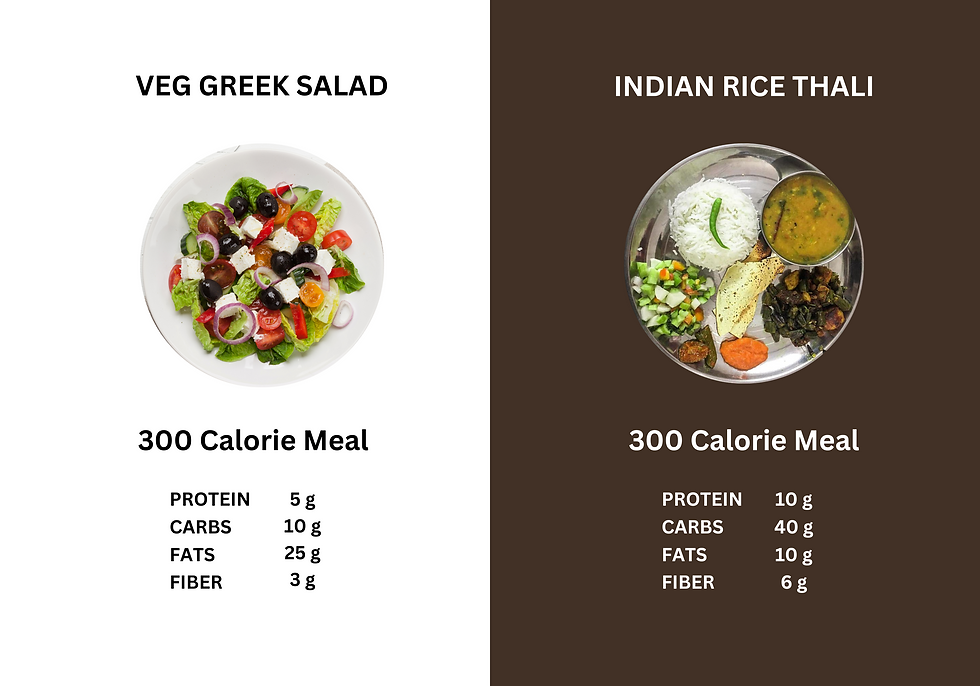Eating Healthy Doesn't Mean Salads
- M.Vamsi

- May 26, 2023
- 2 min read
Updated: Dec 20, 2023
When it comes to eating healthy, most people immediately think of
munching on endless bowls of leafy greens and bland salads.
However, there's so much more to a nutritious and satisfying diet than
just lettuce and vegetables.
Contrary to popular belief, adopting a healthy eating lifestyle
doesn't mean sacrificing flavour or feeling deprived.
An adequate diet, providing all nutrients, is needed throughout our lives.
Food provides our bodies with the energy, protein, essential fats,
vitamins and minerals to live, grow and function properly.
Nutrients that we obtain through food have vital effects on physical
growth and development, maintenance of normal body function,
physical activity and health. A well balanced diet helps protect
against malnutrition in all its forms.
Types of nutrients important for our body
There are 7 major types of nutrients needed by our body which are
classified as
MACRONUTRIENTS (proteins, carbohydrates, fats, fiber and water)
as they are needed in large quantities
MICRO NUTRIENTS ( vitamins and minerals) as they are required
in relatively smaller quantities
Food rich in these major nutrients help us achieve a balanced diet.
The seven major nutrients:
Carbohydrates
These are major sources of energy in all human diets and provide 4 kcal of energy per gram. Glucose and fructose
found in fruits, vegetables and honey, sucrose in sugar and
lactose in milk are types of simple carbohydrates. Starches in
cereals, millets, pulses and root vegetables belong to complex
carbohydrates group.
Proteins
These are structural and functional components of every living cell and are needed for building and repairing tissues.
These also provide 4 kcal of energy per gram.
Fats
A concentrated source of energy providing 9 Kcal per gram
acts as a vehicle for fat-soluble vitamins like vitamins A, D, E
and K and carotenes and promotes their absorption. Dietary
fats are derived from two sources; the invisible fat present in
plant and animal foods; and the visible or added fats and
oils (cooking oil).
Fiber
It consists mostly of carbohydrates but doesn’t provide energy. However, dietary fibre is an important part of essential human
nutrition and is the indigestible part of plant foods that pushes through our digestive system, absorbing water along the way
and easing bowel movements.
Water
It plays a key role in the elimination of body wastes and regulation of body temperature.
Water (in litres) to drink a day = Your Weight (in Kg) multiplied
by 0.033. For example, if you are 60kg, you should drink about
2 litres of water every single day. At 90kg, you'll need around
about 3 litres of water. All you need to do is multiply 0.033 to
your weight in Kg.
Vitamins
These are chemical compounds that cannot be synthesized in the body and are essential for adequate functioning and
processes of the body and for maintenance of the structure of
skin, bone, nerves, eye, brain, blood and mucous membrane.
Vitamins A, D, E and K are fat-soluble, while vitamin C and
the B-complex vitamins are water soluble.
Minerals
These are inorganic elements required for maintenance of skin, hair, nails, blood and soft tissues and have an important
role in nerve cell transmission, acid/base and fluid balance,
enzyme and hormone activity and blood- clotting processes.
Sodium, potassium, calcium, phosphorus, magnesium and
sulphur, while zinc, copper, selenium, molybdenum, fluorine,
cobalt, chromium and iodine are some minerals which can
be obtained with the intake of foods is varied and balanced.
Now that you understand the importance of balancing your meals,
it's crucial to know that achieving this balance can be accomplished
through salads or any other food of your choice. Don't limit yourself!
There are plenty of better food options available.
Contrary to popular belief, eating only salads is not the sole method
for fat loss or maintaining good health. Below is a comparison to illustrate
this point clearly.

Note that both the meals have the same total calories.
Only difference is the balance of Nutrition. One has more Fats and
the other has more Carbs. Body needs both Carbs and Fats. So you can
choose either of these meals as long as it fits in your carbs and fats intake
for the day.
Ultimately to lose 1 kg of fat, you need a calorie deficit of 7200, which can be
achieved through increased activity or reduced food intake. The key is
finding what works best for you and making informed choices.
Explore a variety of foods to create a balanced and enjoyable eating
plan that supports your goals.
Alternatively, you can rely on MANAlifestyle.in, as I specialise in helping you
transform into your best version through personalised fitness assistance.




Comments